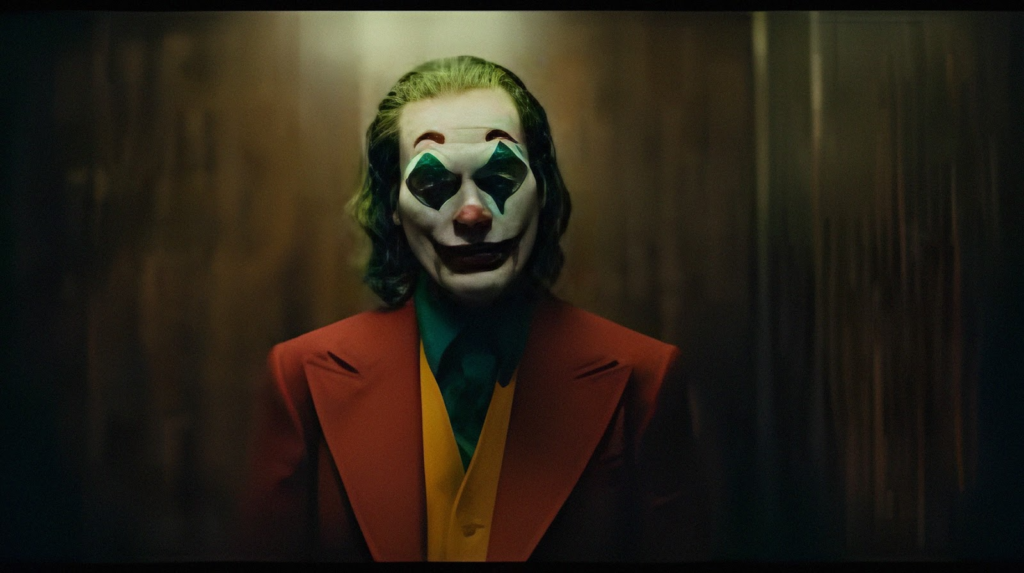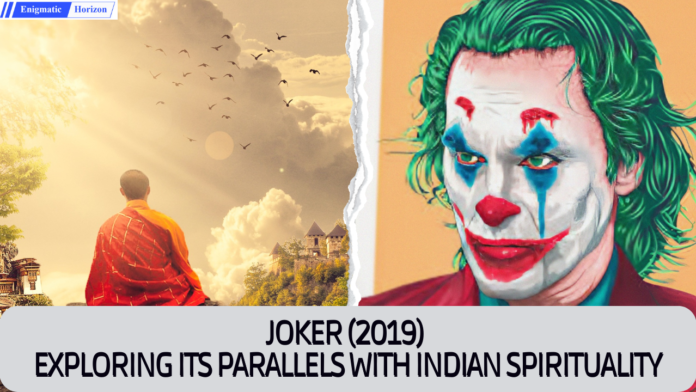Priyal Dholakia (Assistant Editor)
In 2019, the film industry witnessed the release of one of the most captivating and thought-provoking movies ever made, “Joker.” This film took the world by storm with its raw and intense portrayal of the iconic supervillain. Todd Phillips’ film, which Joaquin Phoenix flawlessly portrays as Arthur Fleck, delves deeply into the troubled life of the character.
But there is more to this movie than meets the eye. While the movie primarily explores the disturbing transformation of Arthur Fleck into the notorious Joker, it also gives us a glimpse into the human psyche. It does so by taking us on a wild rollercoaster ride into the twisted mind of Arthur Fleck.
A glance into the world of Joker, aka Arthur Fleck:
“Joker” is a film that tells the story of Arthur Fleck, a troubled man living in Gotham City. Arthur struggles with his identity and feels outcast by society. He dreams of becoming a stand-up comedian but faces constant rejection and cruelty from those around him. As the movie unfolds, we witness Arthur’s descent into madness, leading him to embrace the persona of the Joker.
What made Arthur a supervillain?
The film is a poignant reminder that supervillains are nothing but a manifestation of a sick society. It was the constant bullying and atrocities that Arthur faced that made him a monster. Arthur’s transformation into a villain was a response to the society that failed to support him. He endures relentless mistreatment from those around him, which makes him feel isolated. It is indicative of the fact that Joker is a mere product and a reflection of the sick society we are living in.

In light of this, we can draw some striking similarities between the core themes of the film and Indian spirituality. Let us dive deeper into it and further explore the intriguing connections of the film to Indian spiritual principles.
Karma and the ripple effect
Central to Indian spirituality is the concept of karma, the belief that one’s actions have consequences that ripple through time. In “Joker,” Arthur’s actions reverberate throughout Gotham City, sparking a chain of events that ignite chaos and social unrest. This echoes the idea that every choice we make, no matter how small, can have far-reaching implications. The film reminds us of the importance of mindful actions and the awareness that our deeds shape the world around us.
Dukha and the Quest for Liberation
In the film, Arthur has to go through emotional onslaughts and turmoil, even from his near and dear ones. This makes him apathetic to the ways of the world and people at large and prompts him to become “a villain” to seek vengeance. His vengeful deeds eventually make him antagonistic in nature.
Even according to Indian spiritual principles, causing pain to others is not the solution to avenging one’s own pain. Suffering and pain (referred to as “dukha”) are seen as a natural part of one’s life. Every being has to go through this cycle of suffering according to their deeds and actions (karma). In Indian scriptures, pain is seen as a path to self-realization and discovery, not destruction. Joker used his pain as a means of destruction rather than development, which ultimately made him a villain.
The only way we can liberate ourselves from this cycle of pain (i.e., attain moksha) is by doing good deeds. If we continue doing bad deeds and inflicting pain upon others, we will never be able to free ourselves from this suffering. Hence, the only way to break free from the pain is to spread benevolence and kindness among others.
One significant metaphor worth drawing here is that from the Mahabharata, between the characters of Karna and Krishna. Both Karna and Krishna had to forego their riches, relations, and possessions at some stage of their lives. However, their counterreactions (prati-uttar) to their sufferings were very different. Karna became ill-disposed due to all the things he had to give up, leading him to take the side of Adharma. whereas, Krishna gracefully accepted his losses and continued to embark on the path of Dharma. This is what set him apart on the path of divinity and greatness.

Suffering and the Illusion of Maya
Maya, a Sanskrit term meaning illusion, resonates deeply with the Joker’s character. Throughout the film, we witness Arthur’s transformation from a struggling comedian to the infamous Joker. Arthur hides behind a painted clown’s face, concealing his true self. His metamorphosis symbolizes the illusory nature of identity and the masks we wear in our daily lives.
In Indian philosophy, the notion of Maya suggests that our identities are transient and superficial. We simply wear different masks in our daily lives to fulfill our core essence and purpose. The same message is conveyed in Joker too. He hides behind a “mask” (masking his true identity) to accomplish his higher purpose.
The Duality of Light and Darkness
Indian spirituality often explores the interplay between light and darkness, symbolizing the duality present within every individual. “Joker” artfully weaves this theme into its narrative, painting a haunting portrait of Arthur’s descent into darkness. As the film progresses, the audience witnesses the gradual erosion of Arthur’s sanity, paralleling the battle between light and darkness within his soul. This struggle reflects the spiritual quest for inner harmony and the recognition that light and darkness are two sides of the same coin. Indian spirituality also acknowledges this duality, with concepts like “asuras” (demons) and “devas” (gods) representing opposing forces within us.

Final thoughts:
“Joker” stands as a cinematic masterpiece that goes beyond entertainment. By doing so, it is successful in resonating with audiences at various levels. It compels us, as viewers, to question our own sense of sanity, our behavior, and the world we are living in. The film also mirrors the teachings of Indian spirituality to a great extent. This film serves as a powerful reminder of how cinema holds the power to mold our thinking and perceptions about people.
Have you played the Batman Arkham series, a gaming series which also does justice to the Joker character? Read our review/analysis of Batman Arkham Knight here, and see why it stands out in 2025, ten years after release!
